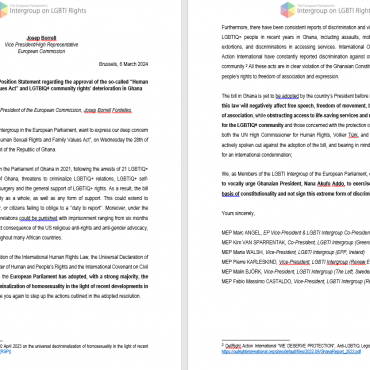MEPs address fellow legislators in the Dutch House of Representatives on proposed bill on legal gender recognition

Paul van Meenen, Chair of the Committee on Justice and Security, Dutch Tweede Kamer (House of Representatives)
Members of the Committee on Justice and Security, Dutch Tweede Kamer (House of Representatives)
Brussels, 29 September 2022
Subject: Maintaining the bill on legal gender recognition as it stands
Dear Committee Chair,
Dear Committee Members,
As Members of the LGBTI Intergroup in the European Parliament, we write to you concerning the current revision of the bill on changing the gender in birth certificates, submitted by the Minister for Legal Protection, Sander Dekker.[1] We understand that this bill has been generating debate and would like to submit, for your consideration, our views on the matter.
We are supportive of the general aims of this bill, which go in the direction of allowing trans youth to live their true self by ensuring self-determination and lowering the age for legal gender recognition (LGR). The bill would also remove the obligation of prior psychological assessment for LGR and would make it possible to request it in the place of residence instead of place of birth. We believe these to be human rights-compliant aims, which exercise due diligence and ensure the best interests of the child. Allow us to narrow down on these arguments.
Compliance with human rights, due diligence, best interests of the child
The aim to lower the age limit for trans youth seeking to access LGR based on self-determination is human rights compliant. Below you can find a compilation of human rights standards calling for it.
- In 2010, the Committee of Ministers of the Council of Europe adopted a recommendation to Members States urging them, among others, to “take appropriate measures to guarantee the full legal recognition of a person’s gender reassignment in all areas of life, in particular by making possible the change of name and gender in official documents in a quick, transparent and accessible way; member states should also ensure, where appropriate, the corresponding recognition and changes by non-state actors with respect to key documents, such as educational or work certificates.”[2]
- In 2015, the Parliamentary Assembly of the Council of Europe adopted standards on the rights of trans persons, calling for quick, transparent and accessible procedures, based on self-determination and irrespective of age to be the standard;[3]
- In 2020, the European Commission published a study on LGR in the EU, as well as a mapping of studies on the difficulties for cross-border situations in the Union.[4] Later that year, the Commission published its LGBTIQ Equality Strategy, where it committed to fostering “best practice exchanges between Member States on how to put in place accessible legal gender recognition legislation and procedures based on the principle of self-determination and without age restrictions”.[5]
- In 2022, the Council of Europe published a thematic report on Legal Gender Recognition in Europe where the LGR-specific recommendations called on the following: “Member States should ensure that LGR procedures for children centre on the best-interest-of-the-child principle and should review explicit or implicit age restrictions that may obstruct that principle in order to ensure children’s access to legal recognition, health and security.”[6]
- by now, our own European Parliament has adopted texts that reflect this, most prominently the Matic report on SRHR, which calls on Members States to abolish the sterilisation requirement but also “to protect transgender persons’ right to self-determination”.[7]
On the matter of due diligence, we must add that the 11th International Classification of Diseases (ICD-11) was already altered to remove “gender identity disorder” from the list of mental illnesses and the WHO clarified how transgender health should be interpreted in light of ICD-11.[8] This momentum paved the way for further depathologisation of trans and non-binary persons’ identities, yet this progress must be led at national level since the EU lacks competence on it. Removing any and every requirement for psychological assessment is therefore the bare minimum for compliance with ICD-11, as well as ensuring that the process is not medical, but administrative.
The proposal this bill seeks to make law is therefore a natural follow up to the human rights standards that were adopted in Europe in the last decade. While the requirement for a court procedure for children below 16 sets a legal-administrative requirement, the current example of Norway stipulates that “From the age of 16 children may apply for an amendment to their legal gender by themselves. Children aged between 6 and 16 must apply for an amendment to their legal gender in concert with the person or persons who have custody of the child. If the parents have joint custody, but the application is submitted with the support of only one of them, the legal gender may still be changed if this is what is best for the child.”[9] If such a requirement goes in the same direction, it will be setting the Netherlands as an example to follow for other countries.
Finally, concerning the best interests of the child, we can only add that it is crucial to allow trans youth to live up to their full potential while being recognised legally in full respect of their gender identity. This is a step that will surely make a difference for trans youth in the Netherlands and elsewhere in Europe by setting a good example.
We urge you in addition to be vigilant for the upcoming public discussion on the bill and its media coverage – we are only too familiar with how discussions on trans issues can quickly deteriorate to questioning the very validity of measures such as the one on the table. We politely ask you to promptly discourage such remarks, to denounce them and to focus on the issue at hand: the lives of kids who only seek to have a happy, dignified childhood, free of violence and discrimination.
One last note on that topic concerning sports, as it is usually a topic where misunderstandings drive the narrative. Being able to exercise and participate in sports communities is important for trans kids as for everyone else. You might hear that gender self-determination is a threat to safety in sports and other situations involving commonly used changing facilities. Be assured: safety and privacy in restrooms is important for all of us. That is why laws already exist that make harassment in changing rooms illegal. These laws are used to prevent assault, keep people safe, and hold offenders accountable. Gender self-determination will not change that. Countries with self-determination models, such as Norway, Malta, Belgium, Denmark, Luxembourg have not reported an increase in incidents in restrooms or changing facilities.
We hope that these arguments can support our fellow legislators in advocating for the importance of this bill, as we are convinced we all share the same aim of ensuring that trans youth has the legal tools to live in dignity and in full respect of their rights under the European Convention on Human Rights.
We thank you for your consideration.
Your sincerely,
Marc ANGEL, Co-Chair, LGBTI Intergroup (S&D, Luxembourg)
Terry REINTKE, Co-Chair, LGBTI Intergroup (Greens-EFA Vice-President, Germany)
Fabio Massimo CASTALDO, Vice-President, LGBTI Intergroup (Non-attached, Italy)
Pierre KARLESKIND, Vice-President, LGBTI Intergroup (Renew Europe, France)
Malin BJÖRK, Vice-President, LGBTI Intergroup (The Left, Sweden)
Maria WALSH, Vice-President, LGBTI Intergroup (EPP, Ireland)
Michal ŠIMEČKA (Renew Europe, Slovakia), EP Vice-President
Frédérique RIES (Belgium), Renew Europe Vice-President
Kira PETER-HANSEN (Denmark), Greens/European Free Alliance Vice-President
Marisa MATIAS (Portugal), The Left Vice-President
Robert BIEDROŃ, FEMM Committee Chair (S&D, Poland)
Sylwia SPUREK, FEMM Committee Vice-Chair (Greens-EFA, Poland)
Anja HAZEKAMP (The Left, Netherlands)
Antoni COMÍN I OLIVERES (Non-attached, Spain)
Cyrus ENGERER (S&D, Malta)
Delara BURKHARDT (S&D, Germany)
Dietmar KÖSTER (S&D, Germany)
Giuliano PISAPIA (S&D, Italy)
Gwendoline DELBOS-CORFIELD (Greens-EFA, France)
Hilde VAUTMANS (Renew Europe, Belgium)
Irène TOLLERET (Renew Europe, France)
José GUSMÃO (The Left, Portugal)
Karen MELCHIOR (Renew Europe, Denmark)
Kim VAN SPARRENTAK (Greens-EFA, Netherlands)
Malte GALLÉE (Greens-EFA, Germany)
Marianne VIND (S&D, Denmark)
Mario FURORE (Non-attached, Italy)
Martin HOJSÍK (Renew Europe, Slovakia)
Monika VANA (Greens-EFA, Austria)
Moritz KÖRNER (Renew Europe, Germany)
Niklas NIENASS (Greens-EFA, Germany)
Niyazi KIZILYÜREK (The Left, Cyprus)
Rasmus ANDRESEN (Greens-EFA, Germany)
Sara MATTHIEU (Greens-EFA, Belgium)
Saskia BRICMONT (Greens-EFA, Belgium)
Sophie IN’T VELD (Renew Europe, Netherlands)
Thijs REUTEN (S&D, Netherlands)
Tilly METZ (Greens-EFA, Luxembourg)
Vera TAX (S&D, Netherlands)
[1] Tweede Kamer (4 May 2021), “Bill: Change of gender in the birth certificate”, available at https://www.tweedekamer.nl/kamerstukken/wetsvoorstellen/detail?cfg=wetsvoorsteldetails&qry=wetsvoorstel:35825.
[2] Committee of Ministers of the Council of Europe (31 March 2010), “Recommendation CM/Rec(2010)5 of the Committee of Ministers to member states on measures to combat discrimination on grounds of sexual orientation or gender identity”, Recommendation 21, accessible on https://search.coe.int/cm/Pages/result_details.aspx?ObjectID=09000016805cf40a.
[3] PACE (22 April 2015), “Discrimination against transgender people in Europe”, Recommendation 6.2.1., accessible at https://assembly.coe.int/nw/xml/XRef/Xref-XML2HTML-EN.asp?fileid=21736.
[4] EC (15 May 2020), “Legal gender recognition in the EU: the journeys of trans people towards full equality” and “Mapping of studies on the difficulties for LGBTI people in cross-border situations in the EU”, accessible at https://ec.europa.eu/info/policies/justice-and-fundamental-rights/combatting-discrimination/lesbian-gay-bi-trans-and-intersex-equality/studies-and-research-lgbti-equality_en.
[5] European Commission (12 November 2020), “Union of Equality: LGBTIQ Equality Strategy 2020-2025”, accessible at https://eur-lex.europa.eu/legal-content/EN/TXT/?uri=CELEX:52020DC0698.
[6] Steering Committee on Anti-discrimination, Diversity and Inclusion (CDADI) (6 July 2022), “Thematic Report on Legal Gender Recognition in Europe”, Paragraph 73, accessible at https://search.coe.int/cm/Pages/result_details.aspx?ObjectId=0900001680a6cd31.
[7] Adopted text, “European Parliament resolution of 24 June 2021 on the situation of sexual and reproductive health and rights in the EU, in the frame of women’s health”, ¶21, accessible at https://www.europarl.europa.eu/doceo/document/TA-9-2021-0314_EN.html.
[8] WHO Europe, “WHO-Europe brief – transgender health in the context of ICD-11”, accessible at https://www.euro.who.int/en/health-topics/health-determinants/gender/gender-definitions/whoeurope-brief-transgender-health-in-the-context-of-icd-11.
[9] Unofficial translation of the “Prop 74 L (2015-2016) Proposition to the Storting (proposal for a legislative decision) – The Legal Gender Amendment Act”, retrieved from the website of Transgender Europe, accessible at https://tgeu.org/wp-content/uploads/2016/07/Prop74LEng.pdf.





